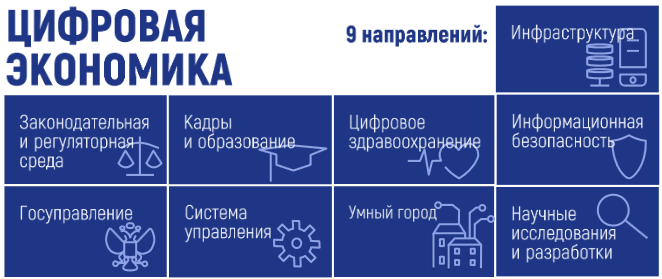"Digital economy" has risen: from the budget will have to allocate 2 trillion rubles

On Monday, participants in the presidium meeting on strategic development and the national project considered the draft passport of the national program "Digital Economy". According to the minister of digital development, communications and mass communications Konstantin Noskov, the project was approved on the whole, as reported by Vedomosti. He also added that the implementation of the program in the budget is planned to lay about 2 trillion rubles.
As it turned out, this is only the amount that for 2018-2024. must spend the federal budget. The total cost of the project is 3.5 trillion rubles. At the moment, found 820 billion, the money provided for the informatization of government agencies. This means that the funds will be spent on organizing the workplaces of ministries and departments, providing them with communication, developing their own IT systems and supporting government information systems (GIS).
It is indicated that the amount of expenditures from the budget includes money for the development of the Mir system and the system of identification of the person - about 110 billion rubles are provided for these items. Another 1.5 trillion rubles are going to attract officials from the business.
It should be noted that in August of this year, the total amount of expenditures on the budget was announced lower - about 1.2 trillion rubles. Over the month, a reassessment of the “digital state” program was carried out, namely, the creation of IT-technologies for the state service and control and supervisory activities. The budget here provided for an increase in the amount from 233 billion to 1.1 trillion rubles. In addition, budget expenditures for “digital technologies and projects” have doubled - up to 288 billion rubles.
The increase is due to the fact that part of the measures from the information infrastructure development project had to be postponed. Thus, according to the project, the budget has reduced infrastructure (up to 465 billion rubles) and extrabudgetary expenses (up to 300 billion rubles).
However, business representatives will have to spend more on the development of digital technologies than previously expected - up to 1.2 trillion rubles. These costs relate to such an important article as the development of financial instruments that involve large corporations in innovation. In particular, it is planned to approve the rules for granting subsidies to banks and VEB structures for preferential lending to companies for digital projects by mid-2019.
The “Digital Economy” program itself was approved by the government in the summer of 2017. At the end of 2017 - the beginning of 2018, the action plans of the program were approved in five directions at once. The total budget of the program at that time amounted to about 500 billion rubles, which were planned to be mastered by 2020. The most expensive was the Information Infrastructure direction mentioned above - they were going to spend about 436 billion rubles on it, of which 100 billion were planned to be attracted from the state budget.
The government, the Agency for Strategic Initiatives, Rostelecom, Rostec, Sberbank, MTS, MegaFon, VimpelCom, Yandex and others became the founders of the ANO Digital Economy. This organization coordinates the work of working groups and centers of competence for programs.
In May, according to the decree of Vladimir Putin, this program was transformed into a national one, with the simultaneous transformation of directions into federal projects. The national program should include federal projects "Regulatory Regulation", "Information Infrastructure", "Personnel and Education", "Information Security", "Digital Technologies" and "Digital Public Administration".
The “digital economy” should be submitted by the government to the Presidential Council on Strategic Development and Priority Projects by October 1. The program is designed for the active participation of regions in financing digital economy projects. To control the implementation of the project for the regions, KPIs on investments in the digital economy are being developed.
